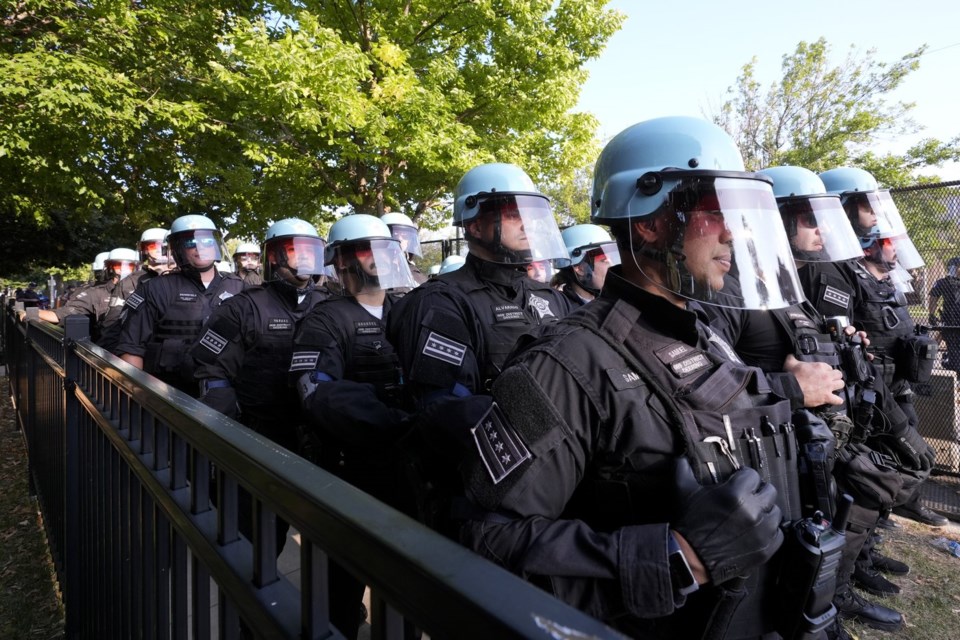CHICAGO (AP) — As far as Chicago’s storied protests go, the numbers outside the Democratic National Convention were unremarkable. But organizers say they did something leaders inside didn’t: Make part of the agenda.
The stakes Despite hosting more political conventions than any other American city, comparisons to the , when police clashed with protesters on live television, were hard to shake. And one small that resulted in dozens of arrests and tense police standoffs didn’t help.
But organizers near the United Center, and police, who spent more than a year , say they were successful in broadcasting different narratives about the nation’s third-largest city.
“This is a very large contingent of people who are not willing to stand by quietly while people who are committing genocide are in our city,” said student organizer Liz Rathburn. “We showed the world that.”
for massive protests in Chicago — which came a month after the Republican National Convention in Milwaukee — were high. The in Milwaukee during the convention was roughly 1,000 people.
Chicago is known for its mass mobilizations, including in 2006 when nearly people took to the streets to call for immigrant rights.
Organizers had predicted that as many as 20,000 would come to a march and rally on the convention's opening day. While they conceded that the numbers didn’t end up that high, they disagreed with the city’s much lower estimate of about 3,500 participants.
Hatem Abudayyeh, a lead organizer and co-founder of the U.S. Palestinian Community Network, said he was pleased with the turnout and the message of the largely family-friendly demonstrations that drew on the Chicago area’s large Palestinian population.
While activists backing numerous progressive causes came to Chicago, they united on a pro-Palestinian, anti-war message.
“We were the show,” Abudayyeh said. “The excitement was happening out here in the streets.”
Most of the large protests were relatively peaceful, but there were dozens of arrests after one group broke part of the around the United Center and following an unsanctioned demonstration outside the Israeli Consulate.
Chicago Police Superintendent Larry Snelling, who was highly visible at all of the major protests, said law enforcement leadership and communication with protest organizers contributed to the calm around convention. While Chicago had helping with convention security, Chicago’s force alone handled the protests.
During the largest marches, hundreds of Chicago officers on bicycles lined the streets and guided protesters through residential streets surrounding the United Center.
“What we learned here is that preparation is everything,” Snelling said Thursday. “Two things you need for success: opportunity and preparation. We had the opportunity to respond to the Democratic National Convention, and we were prepared for it.”
However, police also faced criticism for their tactics and what some called excessive officer presence. In Milwaukee, police were notably absent at the largest convention protests.
During one demonstration outside the Israeli Consulate in downtown Chicago — organized by a group that was not part of the main activist coalition — police far outnumbered the dozens of protesters.
Rows of officers in riot gear and with wooden clubs closed off a busy downtown street to block in protesters. At one point, police surrounded protesters at a plaza, which resulted in several minor injuries and dozens of arrests.
Snelling, who praised officers’ handling, denied that police had “kettled” protesters — when police corral demonstrators in a confined area, a tactic that is banned under a Chicago consent decree. He called the response “proportional.”
In total, there were 74 arrests Monday through Thursday and no major injuries of protesters or police, Snelling said.
Still, the images of Chicago police and protesters facing off brought back flashes of 1968.
The demonstration outside the consulate was promoted with the slogan “Make it great like 68.” Whenever police and protesters came close, activists would start chanting “The whole world is watching,” a phrase used in the 1968 protests.
Snelling and have repeatedly said Chicago has evolved in the more than 50 years since, including by hosting the 1996 Democratic National Convention that largely went off without a hitch.
“If the 1968 convention went down in history as the example of police brutality, then the 2024 convention will go down as the example of constitutional policing," Chicago Mayor Brandon Johnson said Friday.
Snelling put it more bluntly: “Can we stop talking about 1968? 2024, it’s a new standard.”
Activists also took credit for the largely peaceful protests, saying they had their own security and followed city protocols.
A small group of delegates who are part of the expressed dissatisfaction and complained that mentions of Palestinians — who make up the the vast majority of the killed in Gaza since October — were sparse. During Wednesday's convention program, the parents of a 23-year-old American who was taken by Hamas during the Oct. 7 attack in southern Israel spoke.
Still, activists acknowledged smaller crowds than anticipated.
Some protesters speculated that having Vice President Kamala Harris as the new Democratic nominee might have kept some people home. While signs and chants during the protests called her complicit in the war, many said they would wait for her to announce her plans for U.S. involvement in the war.
“I am excited to see what she does for healthcare. I am worried about her policy regarding Palestine and Gaza,” said pharmacist Fedaa Balouta, who is Palestinian. “Our vote matters.”
Bayan Ruyyashi, a 30-year-old biologist from the Chicago suburbs, said she had little hope that the protests, regardless of size, would have a meaningful impact on those inside the convention.
Rather, she said she attended a so that her three children — ages 8, 5, and six months old — could witness the display of community and solidarity.
“I want them to feel that we have support. It’s not just what we’re hearing from Democrats,” said Ruyyashi, whose family is Palestinian and Jordanian. “I need them to know that we’re fighting for our homeland.”
Sophia Tareen, Lea Skene, Jake Offenhartz And Joey Cappelletti, The Associated Press




